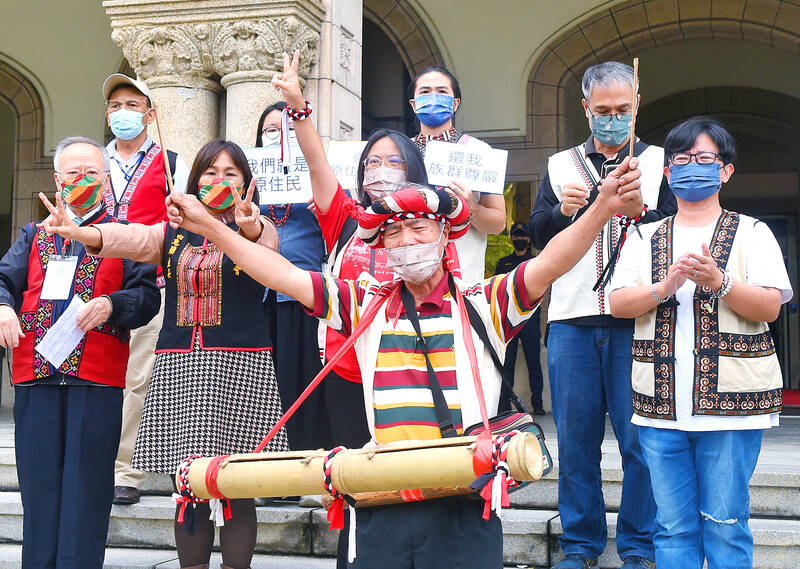The Siraya and other Pingpu groups have the right to be recognized as “indigenous,” the Constitutional Court ruled yesterday as it gave the government a three-year deadline to implement a law to facilitate their recognition.
Reading the ruling, Chief Justice Hsu Tzong-li (許宗力) said that recognition as indigenous should include formerly excluded groups native to Taiwan who speak Austronesian languages and whose culture is related to recognized groups.
Hsu said the ruling was unanimous among the 15 Grand Justices, as judicial officials called such a ruling “quite rare.”

Photo: Liu Hsin-te, Taipei Times
The ruling came after the Council of Indigenous Peoples has for three decades opposed the recognition of about 10 Pingpu groups, including the Siraya.
Council Minister Icyang Parod in June told a Constitutional Court hearing that “recognizing Pingpu groups as indigenous people will adversely affect the rights enjoyed by those who are currently recognized.”
The case was filed by Tainan Siraya Culture Association director Uma Talavan (萬淑娟) after the Taipei High Administrative Court in 2016 ruled against an earlier bid for recognition by the Siraya.
Hsu said that the Constitution guarantees recognition for Austronesian peoples native to the nation who constitute an “ethnic group.”
To prove that, a group would have to present household registration files, including from the Japanese colonial period, when officials comprehensively surveyed households in Taiwan, including the language people spoke at home, Hsu said.
After World War II, most aboriginal groups were registered as “lowland aborigine” or “ mountain aborigine,” but only the latter initially had the chance to be recognized, Hsu said.
However, with yesterday’s ruling, members of Pingpu communities that include elders who speak their original language and have retained Pingpu cultural characteristics would qualify for recognition as an indigenous group, Hsu said.
“They must have the collective identity as an ethnic group,” as well as the required documents to file for recognition, Hsu added.
After the ruling, Uma Talavan told reporters that the Siraya “are happy with this outcome,” calling it a “victory.”
The ruling helps “restore historic justice for us,” she said, but added that it does not automatically result in the Siraya being recognized.
The Council of Indigenous Peoples and indigenous lawmakers might try to impose restrictions that would leave the Siraya without a path to full recognition, she said.
However, Uma Talavan said the ruling is also meaningful for other Pingpu groups, such as the Babuza, Hoanya, Kaxabu, Ketagalan, Lloa, Makatao, Pazeh, Papora, Taokas and Tavalong.
The former regime of the Chinese Nationalist Party (KMT) only recognized “mountain compatriot” groups, initially listing as recognized people the Amis, Atayal, Bunun, Paiwan, Puyuma, Rukai, Saisiyat, Tao and Tsou.
Other groups were added later, starting from when the indigenous council was established in 1996.

CHAOS: Iranians took to the streets playing celebratory music after reports of Khamenei’s death on Saturday, while mourners also gathered in Tehran yesterday Iranian Supreme Leader Ayatollah Ali Khamenei was killed in a major attack on Iran launched by Israel and the US, throwing the future of the Islamic republic into doubt and raising the risk of regional instability. Iranian state television and the state-run IRNA news agency announced the 86-year-old’s death early yesterday. US President Donald Trump said it gave Iranians their “greatest chance” to “take back” their country. The announcements came after a joint US and Israeli aerial bombardment that targeted Iranian military and governmental sites. Trump said the “heavy and pinpoint bombing” would continue through the week or as long

TRUST: The KMT said it respected the US’ timing and considerations, and hoped it would continue to honor its commitments to helping Taiwan bolster its defenses and deterrence US President Donald Trump is delaying a multibillion-dollar arms sale to Taiwan to ensure his visit to Beijing is successful, a New York Times report said. The weapons sales package has stalled in the US Department of State, the report said, citing US officials it did not identify. The White House has told agencies not to push forward ahead of Trump’s meeting with Chinese President Xi Jinping (習近平), it said. The two last month held a phone call to discuss trade and geopolitical flashpoints ahead of the summit. Xi raised the Taiwan issue and urged the US to handle arms sales to

A magnitude 5.6 earthquake struck off the coast of Yilan County at 12:37pm today, with clear shaking felt across much of northern Taiwan. There were no immediate reports of damage. The epicenter of the quake was 16.9km east-southeast of Yilan County Hall offshore at a depth of 66.8km, Central Weather Administration (CWA) data showed. The maximum intensity registered at a 4 in Yilan County’s Nanao Township (南澳) on Taiwan’s seven-tier scale. Other parts of Yilan, as well as certain areas of Hualien County, Taipei, New Taipei City, Taoyuan, Hsinchu County, Taichung and Miaoli County, recorded intensities of 3. Residents of Yilan County and Taipei received

Taiwan has secured another breakthrough in fruit exports, with jujubes, dragon fruit and lychees approved for shipment to the EU, the Ministry of Agriculture said yesterday. The Animal and Plant Health Inspection Agency on Thursday received formal notification of the approval from the EU, the ministry said, adding that the decision was expected to expand Taiwanese fruit producers’ access to high-end European markets. Taiwan exported 126 tonnes of lychees last year, valued at US$1.48 million, with Japan accounting for 102 tonnes. Other export destinations included New Zealand, Hong Kong, the US and Australia, ministry data showed. Jujube exports totaled 103 tonnes, valued at